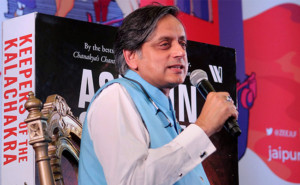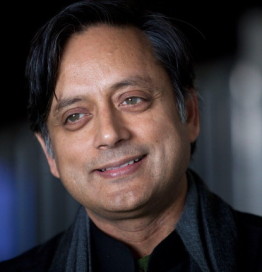By Mohit Dubey
Lucknow– The ruling Bharatiya Janata Party (BJP) has suffered an “irreparable and irreversible reputational damage” in the last four years, says Congress leader and former foreign diplomat Shashi Tharoor.
In the state capital to attend an event of the Indian Professional Congress — an outfit of the grand old party aimed at reaching out to professionals, the two-time MP from Thiruvananthapuram said a momentum was building against the Narendra Modi government and in 2019, the general elections results were sure to go against it.

On a warm Sunday afternoon, as Tharoor spoke to IANS — before the chargesheet in Sunanda Pushkar death case was filed on Monday, he claimed the Karnataka Assembly polls were going the Congress way.
But not attaching much importance to Karnataka, which he said was just a “way station”, the 62-year-old Congress leader said that elections in Gujarat, where Congress inched “astonishingly close” to the Bharatiya Janata Party (BJP) in many constituencies, showed that the tide was now turning against the saffron camp.
The former Union Minister, who currently is the Chairman of the Parliamentary Standing Committee on External Affairs, also pointed out how defeats of the BJP in party strongholds like Gorakhpur and Phulpur in Uttar Pradesh recently had rendered a body blow to the party’s dream to return to power in 2019.
“What the BJP government and Prime Minister Modi has done in the past four years in power?” he asked, slamming them on the twin issues of Goods and Service Tax (GST) and demonetisation.
“GST was a good idea, which implemented in haste and in bad taste, has affected the whole tax system,” he said while pointing out how even the best global economists had come down heavily on the GST, even calling it the most complex tax system.
“Only the ones eating out of their hands think otherwise,” said the erudite Congress Lok Sabha member, who is knowing for his quaint words and subtle expressions.
Sweating profusely due to the sweltering heat and humidity, when the diplomat-turned-politician was asked if this sweat was symbolic of the challenging task the Congress was facing to make a comeback in the state, Tharoor gave a big smile and ducked the question.
“Well there are ifs and buts here and there, but with growing resentment against the BJP-led government at the Centre and the Congress being the biggest opposition party, we are set to be the natural beneficiaries,” he said confidently.
On Monday, the Delhi Police filed charges against Tharoor in the death of his wife Sunanda Pushkar, naming him as one of the accused. The charges were filed in the court of metropolitan magistrate under Indian Penal Code sections related to cruelty against a woman and abetment to suicide. Pushkar was found dead in a luxury hotel room in New Delhi on January 17, 2014.
In his interview he charged the Modi dispensation of rechristening the names of many schemes and welfare programmes of the Congress-led UPA governments and rolling them out as their own.
Asked to comment on whether Congress President Rahul Gandhi when pitted against Prime Minister Modi had a certain disadvantage, Tharoor was quick in his defense of the Gandhi scion, saying: “India has a parliamentary system and not a presidential one, which though has its own merits, does not fit in the Indian context.”
The Congress had its own brand of politics, while the BJP pursued the politics of one man, he said.
Asked whether it was not the “one family” brand of politics that prevailed in the Congress, he rebutted, saying that Rahul Gandhi, soon after his ascendancy. had made it clear that in Congress, every worker and leader mattered.
Coming to his favorite topic of international relations and foreign policy, the dapper Congress leader surprisingly had a back-handed pat for Modi.
“I must compliment the Prime Minister for his tireless efforts, boundless energy and personal time that he has put in the foreign policy and traveling, but sadly things have not moved beyond this.”
Sadly, he said, the foreign policy was being treated in an “episodical manner” by the NDA government, something which had given mistrust and a sense of insecurity in and around the immediate neighbourhood.
Asked how the transition from the United Nations to the hurly burly of politics in India had been when he was fielded as a Congress candidate in Kerala in 2009 and his face lighted up with a smile: “Initially it was pretty tough and I had very many stab wounds in the back and front… But that kind of has stabilized now,” he said. (IANS)














